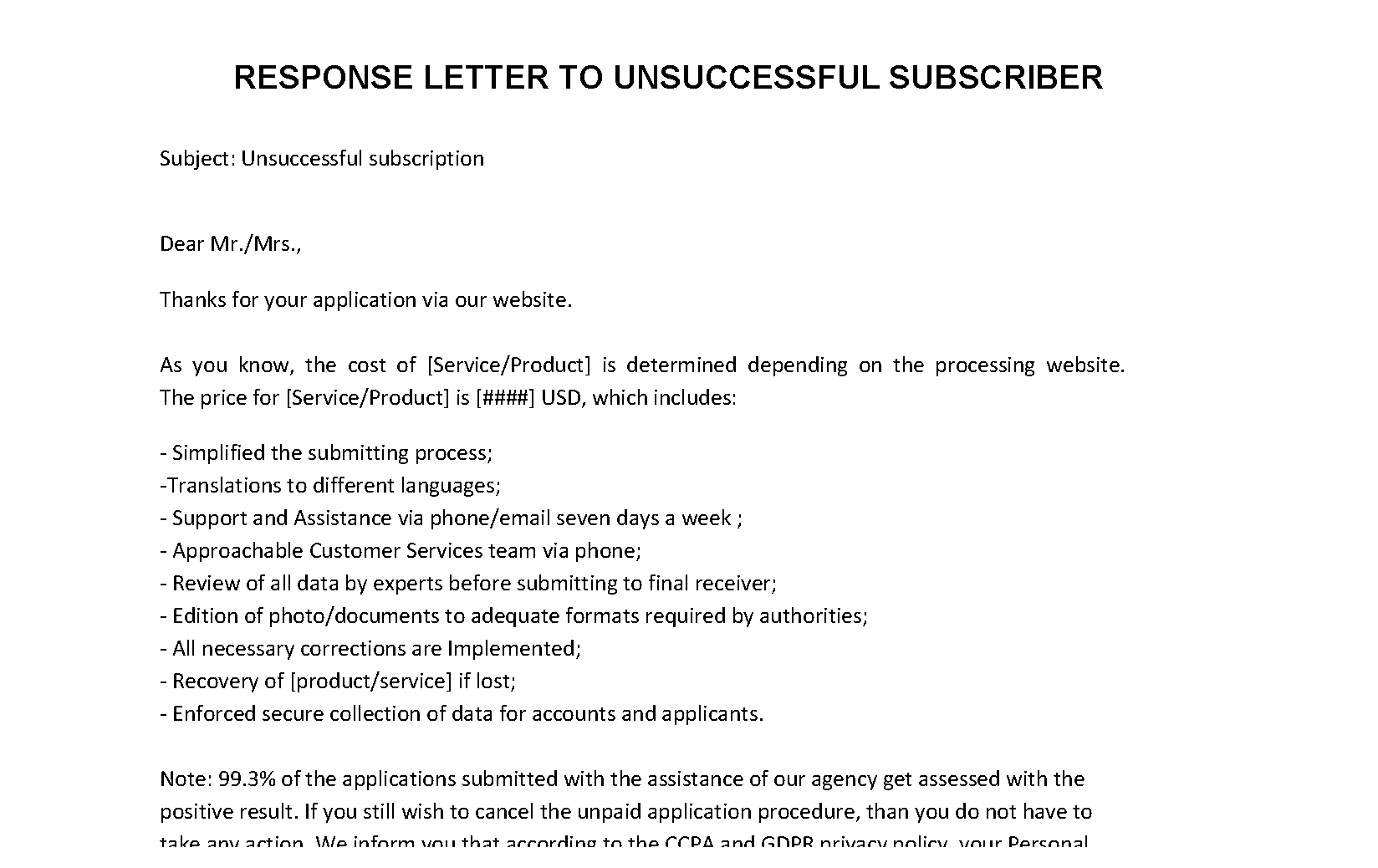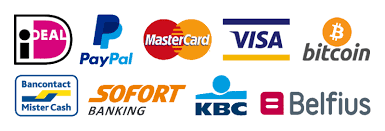CCPA Response Letter to Unsuccessful Subscriber
Save, fill-In The Blanks, Print, Done!

Download CCPA Response Letter to Unsuccessful Subscriber
Today: USD 3.99
Download It Now

Available premium file formats:
Microsoft Word (.docx)- This Document Has Been Certified by a Professional
- 100% customizable
- This is a digital download (47.57 kB)
- Language: English
- You will receive a link to download the file as soon as your payment goes through.
- We recommend downloading this file onto your computer.
Did your company already implement a "Do Not Sell My Personal Information" page and have a polite reply in place when customers are not completing the application procedure on your website to start using your products or services? Take a look at this Response Letter to Unsuccessful Subscriber now.
Businesses that need to comply with CCPA or GDPR must inform all visitors that applied via the website for products or services, but that did not complete the full application procedure and input their Personal Information in your system, to inform them that they will be opt-out of the sale of personal information to third parties, subject to certain defenses.
Besides this, your website must include a “Do Not Sell My Personal Information” link in a clear and conspicuous location on a webpage. After a consumer has an opt-out, you cannot request reauthorization to sell a consumer’s personal information again for at least 12 months.
This response is a sample letter that you can send when an inquiry comes in that includes personal information of a customer, but that did not proceed to use your products or services. You can modify this letter to meet the needs of your business, and save or print it as required. This response letter is intended to be used when informing a (potential) consumer that his/her Personal Information will be deleted and forgotten.
By implementing the opt-out and sending a proper response to your customers or website users, you can be sure to comply with these specific requirements of the California Consumer Privacy Act (CCPA) and the General Data Protection Regulation (GDPR) directives. The penalties for contravening the CCPA and GDPR are serious enough to make sure you will remain within the law at all times. Implementing this message and corresponding action will help to prevent penalties from happening.
The CCPA is a sweeping change to existing privacy laws is an important change in data privacy regulations in the USA, as it aims to give Californian consumers broad rights to access and control their personal information. The bill (AB-375) was passed by the California State Legislature and signed into law by the Governor of California, on June 28, 2018, to amend Part 4 of Division 3 of the California Civil Code.
The CCPA applies to any business, including any for-profit entity that collects consumers' personal data, which does business in California, and satisfies at least one of these thresholds:
- annual gross revenues in excess of $25 million;
- possesses the personal information of 50K or more consumers, households, or devices; or
- earns more than half of its annual revenue from selling consumers' personal data;
- organizations are required to "implement and maintain reasonable security procedures and practices" in protecting consumer info.
Definition Personal Information according to the CCPA:
Any information that identifies, relates to, describes, is capable of being associated with, or could reasonably be linked, directly or indirectly, with a particular consumer or household. Unique Examples: the real name, alias, postal address, unique personal identifier, online identifier, internet protocol (IP) address, email address, account name, social security number, driver's license number, passport number, search history, biometric data, geolocation or other similar identifiers.
The intentions of the Act are to provide California residents with the right to:
- access their personal info;
- prevent the sale of personal info;
- know what personal info is being collected about them;
- know whether their personal info is sold or disclosed and to whom;
- request an organization to delete any personal data about a consumer collected from that consumer;
- not be discriminated against for exercising their privacy rights.
Enforcement date: January 1, 2020, at which time those businesses in non-compliance may face civil fines between $2,500 and $7,500. Californian residents have the private right of action for data breaches, in case of failure is proven, there can be statutory damages between $100 and $750.
We're here to help you become compliant. The CCPA comes with a set of Rules and Regulations for the protection of personal data inside and outside the state of California and affects all businesses that save personal data from California residents.
We provide example CCPA document templates and also a complete set of CCPA templates in order to help you to comply with the new amendment of the California Civil Code. These CCPA document templates are provided in Microsoft Office formats, and easy to customize to your organization’s specific needs. Often completed example documents are also provided in order to help you with your implementation in order to save precious time.
Download this Response Letter to Unsuccessful Subscriber now or check out our fit-for-purpose CCPA Compliance Toolkit here or a free CCPA Compliance Roadmap! The document(s) will be available to download immediately after purchase.
DISCLAIMER
Nothing on this site shall be considered legal advice and no attorney-client relationship is established.
Leave a Reply. If you have any questions or remarks, feel free to post them below.
CCPA Compliance Templates
What is required for California CCPA compliance? How do I make my website CCPA compliant? Does my privacy policy need CCPA wording?
Read moreRelated templates
Latest templates
Latest topics
- GDPR Compliance Templates
What do you need to become GDPR compliant? Are you looking for useful GDPR document templates to make you compliant? All these compliance documents will be available to download instantly... - Google Docs Templates
How to create documents in Google Docs? We provide Google Docs compatible template and these are the reasons why it's useful to work with Google Docs... - IT Security Standards Kit
What are IT Security Standards? Check out our collection of this newly updated IT Security Kit Standard templates, including policies, controls, processes, checklists, procedures and other documents. - Letter Format
How to format a letter? Here is a brief overview of common letter formats and templates in USA and UK and get inspirited immediately! - Google Sheets Templates
How to work with Google Sheets templates? Where to download useful Google Sheets templates? Check out our samples here.
cheese
